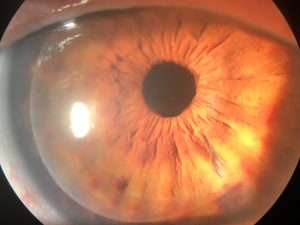
The cornea is the clear, front window of the eye. It helps focus light into the eye so that you can see. The cornea is made of layers of cells that work together to protect your eye and provide clear vision.
Your cornea must be clear, smooth, and healthy for good vision. If it is scarred, swollen, or damaged, light is not focused properly into the eye. As a result, vision can be blurred or filled with glare. Common problems leading to corneal dysfunction include Fuchs’ endothelial dystrophy, keratoconus, various infections, and trauma.
If the cornea is damaged and your vision is poor despite glasses, contact lenses, or other methods of visual therapy, it might be necessary to replace the cornea. This is known as a corneal transplant – when the diseased cornea is removed and replaced with a clear, healthy cornea from a human donor.
A human donor is someone who chooses to donate (give) his or her corneas after their death to people who need them. All donated corneas are carefully tested to make sure they are healthy and safe to use. Unlike other types of organ transplants, there is no need to undergo matching for a cornea. Because of this, there is no waiting list – surgery can be scheduled as an outpatient procedure – and the chances of rejection are relatively low. Care for a cornea transplant involves the use of drops and regular follow up with a cornea transplant specialist.
There are different types of corneal transplants. In some cases, the entire cornea needs to be replaced. In other cases, only the front and middle layers of the cornea are replaced. In the United States, corneal swelling, also known as edema, is the most common cause for needing a cornea transplant. In this situation, only the innermost layer is removed and replaced – also known as endothelial keratoplasty.
Dr. Cervantes offers some of the most advanced cornea transplant options for various corneal diseases. He serves as the Medical Director for Eversight Connecticut (formerly known as the Connecticut Eye Bank), and was the first surgeon in Connecticut to offer Descemet membrane endothelial keratoplasty (DMEK) for patients with corneal edema and Fuchs’ dystrophy.

